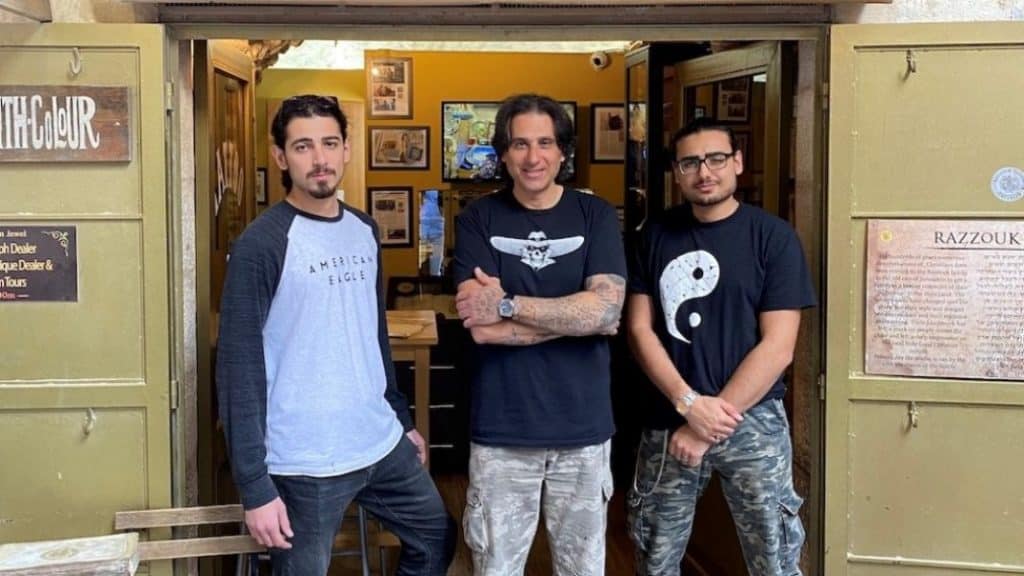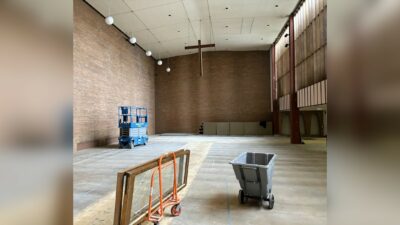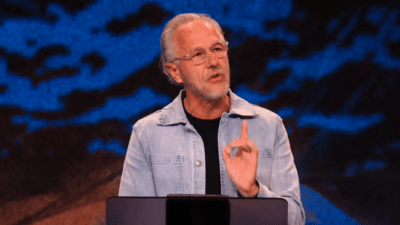Razzouk Tattoo studio in Jerusalem’s Old City is most likely the oldest in the world. It is an iconic landmark, attracting tourists from all corners of the Earth, because the Razzouk family has been tattooing since the year 1300.
They began in Egypt, their homeland, tattooing crosses on Coptic Christians. Then five hundred years ago some of the Razzouks visited the Holy Land and decided to stay. Despite hard times in the region, the Razzouk tattooing tradition has remained alive for 28 generations.
Today Wassim Razzouk is the man behind the shop and the current family patriarch. Despite being a custodian of one the longest traditions in the world, Wassim has a middle-aged hipster look: scruffy beard, long hair and tattooed arms poking out of a Harley-Davidson leather jacket make him recognizable even from a mile away.
In addition to his passion for Harley-Davidson motorcycles, Razzouk is a devout Coptic Christian. During my recent visit, he was cheerful and energetic, always willing to talk about history, faith and tattoos.
This interview has been edited for clarity.
Your tax-deductible gift helps our journalists report the truth and hold Christian leaders and organizations accountable. Give a gift of $30 or more to The Roys Report this month, and you will receive a copy of “Hurt and Healed by the Church” by Ryan George. To donate, click here.
Jovan Tripkovic: For 700 years the Razzouk family has been tattooing marks of faith. Your family has been in this business for 27 generations (28 with your sons). Tell me about the beginning of this great journey.
Wassim Razzouk: We are a Coptic Christian family. We started the tattooing tradition back in Egypt, where we used to tattoo Christian Copts with a small cross on the wrist. That was the sign of their Christianity. It was used to mark Christians, so Christians can know and identify each other with this little cross. It was also used to enter churches, as a passcode. It was the ultimate sign of your Christianity because you had to prove you are a Christian to enter a church.
Tripkovic: The Razzouk family learned how to tattoo in Egypt. During the pilgrimage to the Holy Land they decided to settle. Why?
Razzouk: On the way from Egypt, they stopped in Bethlehem for a bit. They discovered the tradition of tattooing Christian pilgrims with the Jerusalem Cross and not the Coptic Cross.
Christian pilgrims used to come to the Holy Land and they would bring their professions with them in order to survive, to make ends meet. A carpenter would work as a carpenter, a builder would work as a builder, even during the pilgrimage. Pilgrimage back then wasn’t a couple of days or weeks, it was a several months-long journey.
The journey from Egypt, Europe or England used to take months. Pilgrims wouldn’t come here for a couple of days and go back. They would stay in the Holy Land, work here and save money for the journey back home. Like other pilgrims, my family brought the profession with them, which was the art of tattooing.
When they discovered that Christian pilgrims tattoo themselves as a certificate of their journey to the Holy Land and that they were paying for it, more than Christian Copts in Egypt, they decided to stay.
Tripkovic: Where do your customers come from?
Razzouk: They come from all over the world. The majority is from America! It’s seasonal and depends on the time of the year. Right now, we don’t have American pilgrims because it is summer. I guess Americans would rather go to Hawaii than come to the desert and Jerusalem, in this heat. However, Italians, Germans, Brits and other European pilgrims come during the summer.
Orthodox Christians from the Arab countries (Iraq, Syria, Lebanon) come as well. These Christians would have not been able to come to the Holy Land after 1967 because Israel closed its borders with those countries. But now these people are immigrants and come to Israel with their American, Australian or Canadian passports.
Ethiopians are also a big part of our customer base. They come to the Holy Land and they don’t want to go back without getting a tattoo.
Tripkovic: Do you also tattoo many Jews? Palestinian Arabs? Other religions/groups or mostly Christians? Why so?
Razzouk: Not many Jews or Muslims come to get tattooed in our shop. It’s mostly Christian. The reason is that we mostly do Christian symbols.
Tripkovic: Some Christians think tattoos are evil, idolatry or forbidden as marks on the body. Do you encounter these kinds of Christian believers sometimes? And what do you say to them?
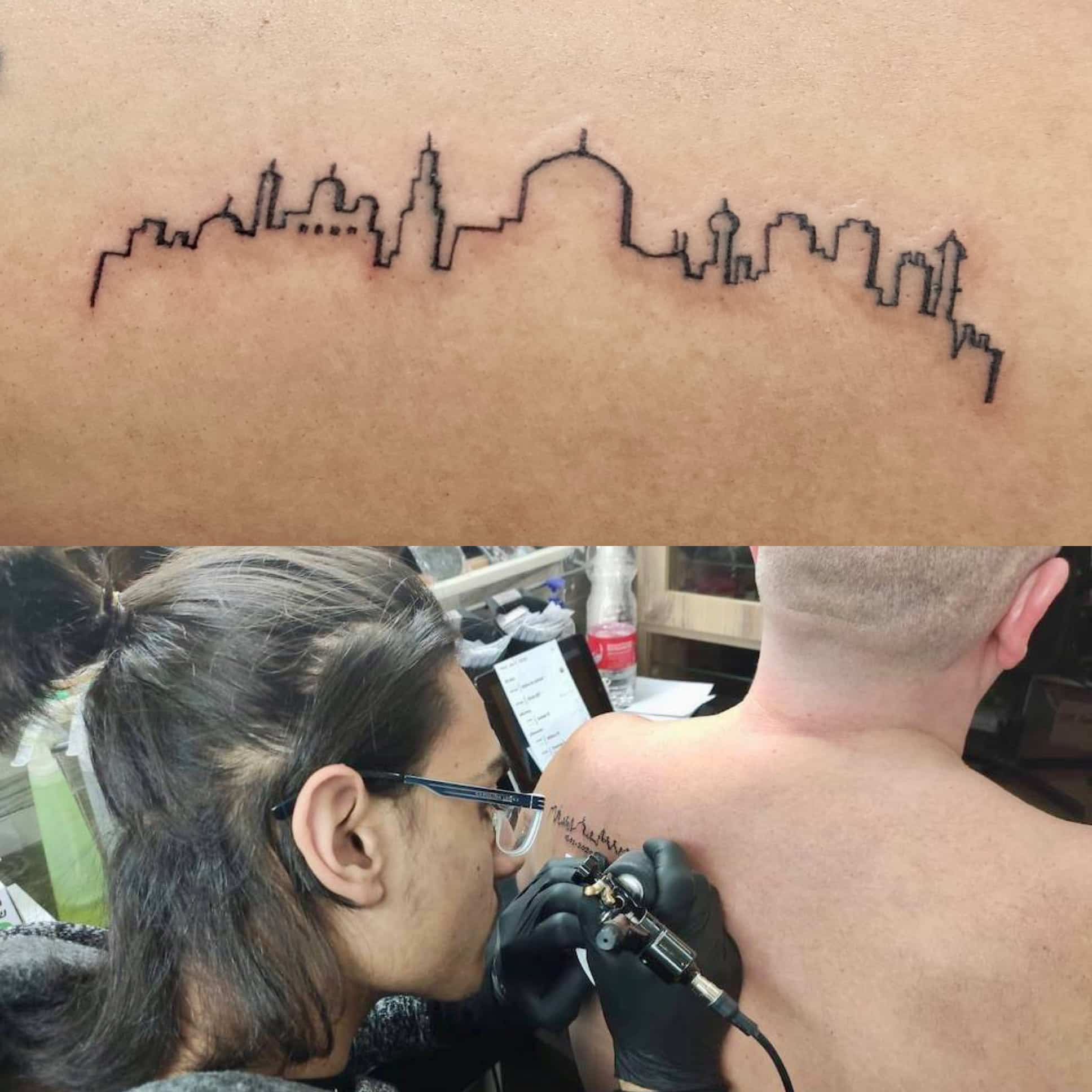
Razzouk: Usually people who come to the shop to get tattooed are ready for them and have already passed this stage of thinking. God did not prohibit Christians from getting tattoos, he prohibited the Canaanites from marking their body for the dead. It’s in Leviticus 19:28.
Tripkovic: Is tattooing becoming more popular among Christians? If so, why?
Razzouk: Yes, it is. Recently, more Catholics and Lutherans started to come to our studio. Especially now that a few very well-known priests and pastors from the United States got tattoos here in the shop and shared their experience on social media. More and more bishops, nuns and priests are not ashamed to say that they got a tattoo on their journey to the Holy Land. All of the sudden, a 70-year old grandma, who always told her children or grandchildren not to get a tattoo, is sitting in my studio getting one.
Tripkovic: In addition to a tremendous tradition, your family preserved an extraordinary stamp collection. What is the history behind this collection?
Razzouk: If you travel to Egypt and you visit traditional Christian tattooists, you will see that they have wooden stamps that they use as tattoo stencils. These stamps originate from Egypt and they are still used in that country. Some of them are ancient.
The technique of using wooden stamps as stencils is still used in Egypt and it came with my family when we arrived in the Holy Land.
Yes, we still have original stamps! However, my ancestors carved new designs, relevant to the Holy Land and pilgrimage such as the Jerusalem Cross.
Tripkovic: How much did the Razzouk tattoo design evolve during the time? Do you still model your tattoos after stamps from your collection?
Razzouk: We still use old stamps! The majority of our work focuses on stamps, traditional and historic designs. That doesn’t mean that we don’t do any other kinds of tattoos. We also do tattoos that are tourist related such as the Jerusalem skyline or an olive branch. However, most of our work comes from old designs. We create new designs as well that are modeled after old stamps.
Tripkovic: I’ve noticed that the most common tattoo is the Jerusalem Cross. What other Christian symbols are popular among your clients?
Razzouk: Designs that are very popular are: the Crucifixion of Jesus, the Resurrection of Jesus, Saint George slaying the dragon, Archangel Michael fighting the devil and the Angel of the Apocalypse.
Tripkovic: What is the most meaningful tattoo to you?
Razzouk: The Jerusalem Cross, because of its meaning. The central cross represents Jerusalem as the center of the world. And four-corner crosses represent Christianity spreading to the four sides of the world. Pilgrims come from all four corners of the world and they become a part of Jerusalem, and Jerusalem becomes a part of them. This is the symbolism of the Jerusalem Cross. The Jerusalem Cross is the pure pilgrimage sign. That’s why I think it is the most meaningful one for our shop and our clients.
Tripkovic: Your grandfather tattooed the Emperor Haile Selassie of Ethiopia in the 1930s. You had an opportunity to tattoo a lot of famous people. Can you talk about that? How does it affect your business?
Razzouk: It doesn’t matter if they are celebrities, well-known or not. I tattooed [American evangelical] Pastor Matt Chandler and his wife. After I tattooed them, I can’t tell you how many people came to my shop because of their following.
Another [American, Catholic] priest, Father Mike Schmitz had a video against tattooing and how he would never get one. When he was in the Holy Land, he came to our studio and got a tattoo. After that he made a video, explaining why he got a tattoo. In the video he described his tattooing experience in our family shop, saying that tattooing is a tradition for pilgrims. Many people from Brazil, Mexico and Portugal followed Father Mike Schmitz and got a tattoo in our studio.
These days, Pastor Matt Chandler and Father Mike Schmitz have more followers than the Emperor Haile Selassie of Ethiopia back then. I also tattooed the famous British journalist and BBC presenter Fern Britton. Many people from Britain came to our shop because of her. Some of the producers of The Chosen, a television series, were our clients as well.
In the age of celebrities and social media influencers, this helps our business a lot. Some of our clients when they come to our shop tell me that I am a celebrity. I don’t know why people like to put it this way.
(Earlier this year, Wassim Razzouk tattooed Rod Dreher, a well-known conservative American Orthodox Christian writer and editor.)
So this happened yesterday during Orthodox Holy Week in Jerusalem, at Razzouk Tattoo, the Coptic ink shop in the Old City. pic.twitter.com/Lc3HDY40qx
— Rod Dreher (@roddreher) April 18, 2022
Tripkovic: The Razzouk family has been tattooing for 27 generations, 28 with your sons. Your sons are getting their foot in the world of tattooing. Do you think it’s your family’s destiny to tattoo pilgrims?
Razzouk: I think so. If you go back a century ago, there were many tattoo artists who were doing tattoos for pilgrims. Some of them were Armenian, others were Palestinian Christians and there was even a Brit who stayed in the Holy Land for a long time, tattooing pilgrims.
All of them discontinued their tattooing operations. Their children and families didn’t take over. In some instances, a new generation would look down upon the tattooing craft, choosing a more socially respected career. In some places in the world, tattooing is still frowned upon. Internet and TV shows reversed this trend, turning tattoo artists into celebrities.
All of these tattoo shops and artists disappeared within a generation and our family has continued. I took over at the right time because of the internet boom. That helped us a lot in the last 10 years.
I also didn’t want to become a tattooist, until something just hit me one day. It was a call! It was meant to be!
Tripkovic: For years you resisted the idea to join the family’s business. Finally, in 2007 after long persuasion you decided to step up and take over the studio. If your answer was no, that would mean the end of a 700-year-old tradition. What was going on in your head during that time? What was the final factor that persuaded you to continue your family’s calling?
Razzouk: That’s exactly what it is! It’s the weight of responsibility! It finally hit me. I remember reading an article about my father, in which he expressed his sadness that this beautiful tradition will die with him because his son, me, is not willing to continue the tattooing tradition.
This made me think about responsibility. And I concluded that I need to do it at least as a part-time job just to keep it alive. The same way my father did it. He wasn’t only a tattoo artist. He had a souvenir shop and in the back of his shop he had a tattoo studio. My father wasn’t the best tattoo artist in the world and that’s probably the reason why I didn’t want to do it. I didn’t like the way my father was doing it. Regardless, he did it to keep the tradition alive.
Tripkovic: The Razzouks are Coptic Christians. What is the place of faith in your daily life and your work?
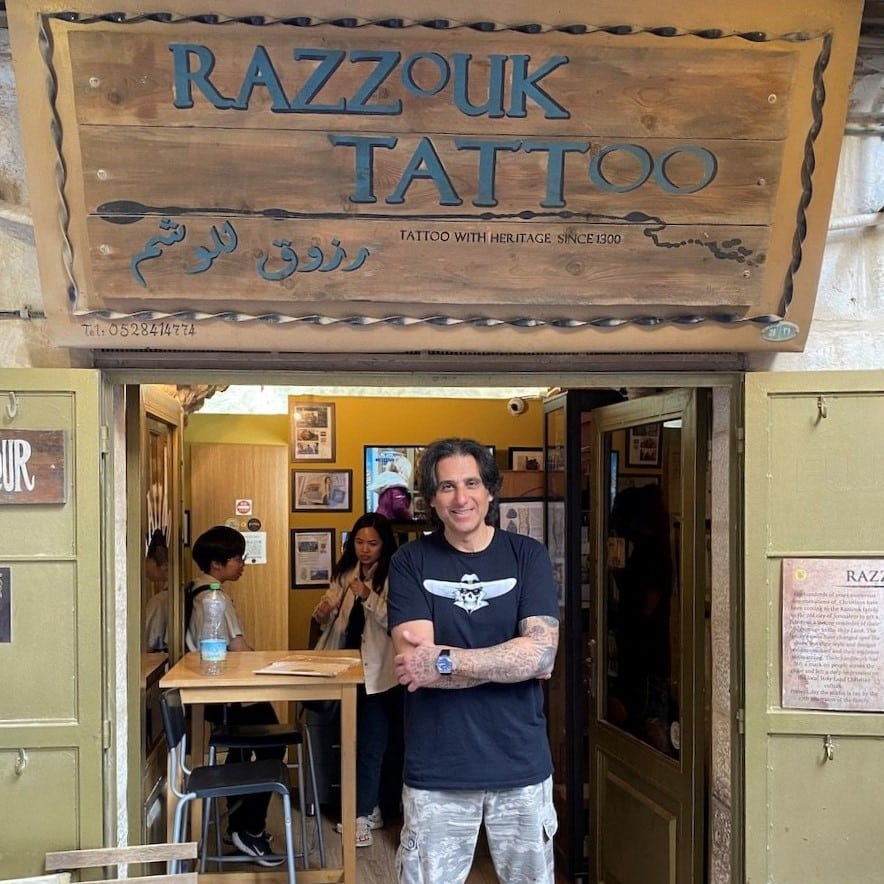
Razzouk: Being a Christian in the Holy Land is not an easy thing. It’s very difficult. We are persecuted, we are looked down upon, we are the minority. Being an Arab or Palestinian Christian makes it even more difficult. It’s not easy to be a Palestinian Christian in a country where you have the Jewish State that discriminates between Jews and non-Jews and on the other side you have Muslim Arabs who consider Christians to be pagans and frown on them.
Faith plays a tremendous role in daily life. My strength comes from being a Christian and devout believer, who prays to God every day and thanks God for the opportunity that has been given to my family to become famous around the world. And not only that, but also to spread the word in my own way, by tattooing pilgrims. I help spread the word of God.
Tripkovic: Years ago you started the ambassadors program. The Razzouk tattoo brand has ambassadors in the United States, United Kingdom, France among other countries. How do you select brand ambassadors? What do you hope to achieve with this initiative?
Razzouk: I think it was in 2015 or 2016, I really can’t remember. We never reached out to tattoo artists, asking them to become ambassadors. We wait for them to email us. Occasionally, tattooists from around the world would send a message, expressing their desire to become ambassadors.
After reviewing their work and social media profiles, we decide if we want to proceed with them. If we feel that a person is not a good candidate we don’t continue the conversation.
However, the majority of people who are interested in becoming ambassadors, are actually faithful Christians, appreciating our family’s tradition. They don’t want to become ambassadors only to advance their business. They do it to show respect. It’s an honor for them to come to the Holy Land, to the studio and experience the history, tradition and the energy of our shop.
What happens here in the shop is almost like baptizing people. They see it, not only through work, but through the eyes, smiles, faces and sometimes tears of pilgrims who come to our studio to become a part of pilgrimage tattoo worldwide historic club.
We would wait for them to call us and when they were accepted, we asked them to come to our shop at least a week and spend time with us. Once we establish connection and trust with them, we provide them a certificate to take back home and do tattoos according to our designs. They can also give certificates to their clients that comes from us and not them. People who want to be part of this history but can’t visit the Holy Land for a variety of reasons can experience our tradition.
Tripkovic: Razzouk tattoo has been a well-known brand long before the ambassadors program. One might argue that this new initiative might dilute your brand. What is your response to that?
Razzouk: Our global popularity is the reason why we started this program. We have been asked many times by people from all over the world about getting our tattoos. Some people even offered to pay me to travel to their countries to tattoo them. I noticed an increase in these requests. People started to email us, asking for blessings to do a tattoo modeled after our designs in their countries. That’s possible to do by visiting our website. However, people don’t want to steal our designs.
Going to a local ambassador, clients are aware that their tattoos come with a blessing and approval of the Razzouk family. I think it doesn’t dilute the brand. It actually strengthens and spreads this tradition all over the world. We want to bring our tattoos to people who can’t visit Jerusalem.
Tripkovic: Countless media, including Deutsche Welle, the New York Times, BBC, CNN featured your story. How does that make you feel? Do you take that as a recognition of your family’s long tradition and craftsmanship?
Razzouk: Yes, of course! It is a recognition and fascination. When the CNN or the BBC journalists visit our shop for an interview, they can’t hide their surprise. They are fascinated by the history and how many generations kept this tradition alive.
Media coverage just happened. I’ve never pushed for any of it. The only thing we did was to start a Facebook page, a website and Instagram profile.
Tripkovic: Your business model heavily relies on tourists. What was the impact of the COVID-19 pandemic on your studio?
Razzouk: It had a huge impact. We stayed in business for so many generations because of pilgrims. During the COVID-19 pandemic, it was very difficult for us because there were no tourists. The borders were closed. The shop was almost closed for two years. Luckily it only lasted for two years. Now things are getting back to normal.
During the pandemic, we started the website with the online store. We were spending our savings like everybody else, trying to survive day by day and hoping for things to become better.
In the meantime, we also decided to open another tattoo shop in the city center. The new shop is not Razzouk Tattoo. It has a different name and it’s for local clients. COVID taught us that we need to have a source of income that is not dependable on tourism.
Tripkovic: Razzouk studio prides itself on providing affordable tattoos. What is the price range of your tattoo art? And what is the best way to schedule an appointment?
Razzouk: Our minimum price, for which you can get a nice Jerusalem Cross tattoo, is about 75 dollars. Most of our designs are within the range of 75 to 150 dollars. Sometimes it can go up to 300 or 400 dollars depending on a tattoo’s size.
People can send us messages on Facebook, Instagram and the website through the contact form. We reply on a daily basis to our client and we schedule them quickly. Contrary to expectation, we don’t have a long waiting list because we don’t do one or two tattoos a day like famous tattoo artists. We take people right away.
We schedule our appointments an hour apart every day, between each appointment because we expect people to walk in. I highly recommend to future clients to set up an appointment and to give us at least a week or two. This way, they will have a guaranteed spot.
Tripkovic: Your sons Anton and Nizar are deeply involved in the family business. Where will the Razzouk tattoo brand be in the future? Are you ready to pass the torch to the 28th generation?
Razzouk: Yes, I am ready! I would like to see my children grow more in the business. They are still very young: 21 and 19 years old. They would have to work with me for the next couple of years until they fully grasp the responsibility and be able to take over. I would be happy to pass the torch.
I didn’t force my children to go into the family business. They actually love it. They see the brand, respect, appreciation and recognition and they want to be part of it. I am proud that I achieved to make this profession and business attractive for my children. I don’t want them to just think of this as a business. I want them to see themselves as custodians of this tradition rather than just tattoo artists.
We want to grow in the future. We have offers from all over the world to expand. We are reluctant to go commercial. We don’t want to be commercial. I see many different ways to spread the awareness of our brand globally. Maybe one day, we would organize a tour and visit our ambassadors around the globe.
God keeps sending us a lot of opportunities and I think that it’s a sin to miss out on them. I hope that our shop will be the most famous tattoo studio in the world. My ambition is to reach this level of recognition. That would be an achievement of my life.
This article originally appeared at Religion Unplugged.
Jovan Tripkovic is a graduate student and teaching assistant at the University of Wyoming and a contributor to ReligionUnplugged.com and other publications.




